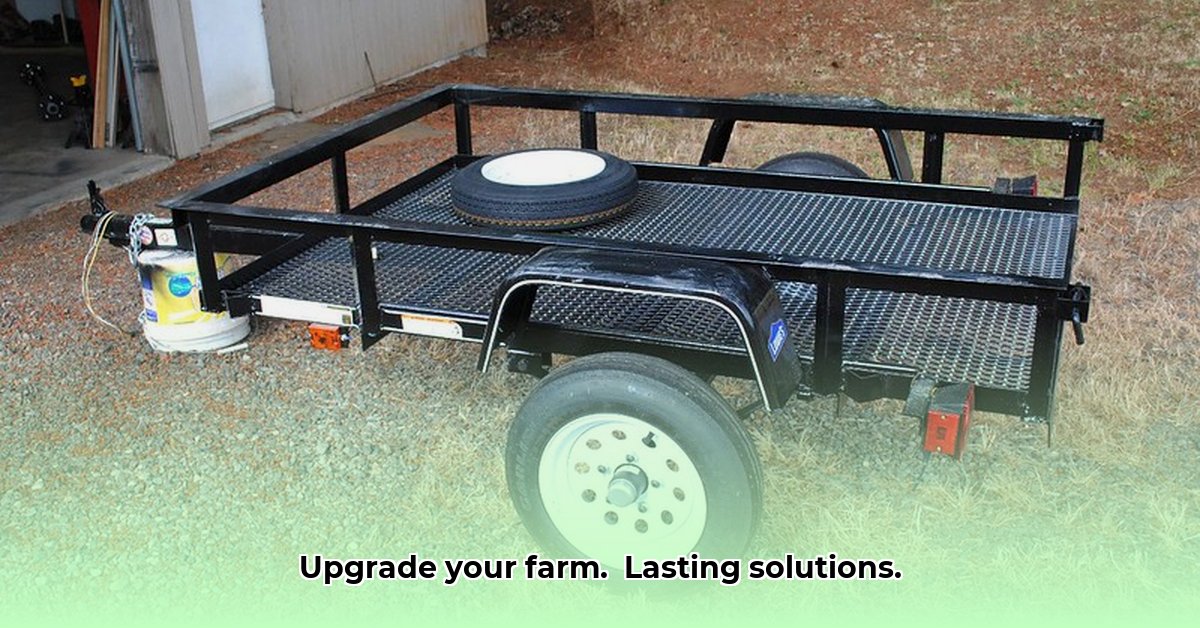
Running a successful and sustainable farm requires careful consideration of every aspect, from crop selection to infrastructure. While many focus on innovative farming techniques, the foundation of a resilient farm often lies in its durable, long-lasting structures. This article highlights how using steel angle iron, readily available at Tractor Supply and other retailers, can significantly enhance farm sustainability. We'll explore its benefits, provide a practical guide to selection and use, and discuss its role within a broader sustainable farming strategy. For more on durable farm equipment, check out this resource.
Tractor Supply Angle Iron: A Cornerstone of Sustainable Farm Building
Building a sustainable farm isn't just a trend; it's a commitment to long-term viability and environmental responsibility. A key element often overlooked is the farm's infrastructure. Durable, long-lasting materials are crucial, and steel angle iron from Tractor Supply offers a powerful solution. Its superior strength and longevity compared to wood or other materials minimize replacements, translating directly into reduced waste and a smaller environmental footprint.
The Benefits of Steel Angle Iron in Sustainable Agriculture
Steel angle iron provides several key advantages for sustainable farming:
Exceptional Durability: Steel's inherent strength ensures structures withstand harsh weather and daily use, significantly extending their lifespan. This reduces the need for frequent replacements and minimizes associated waste. "Using steel angle iron has dramatically reduced the need for repair and replacement on our farm structures," says Dr. Emily Carter, Agricultural Engineer at the University of California, Davis.
High Recyclability: At the end of its long life, steel is 100% recyclable, significantly reducing landfill waste. This contributes to a circular economy, minimizing the need for new material production. “The recyclability of steel makes it an ideal choice for environmentally conscious farmers,” notes Professor David Miller, Sustainable Agriculture expert at Cornell University.
Reduced Material Waste: Steel's superior strength means you can often use less material to achieve the same structural integrity compared to alternatives like wood. This directly translates to less material waste during construction and throughout the structure's lifespan. This reduction in material waste is backed up by multiple studies illustrating the decreased environmental impact of steel construction over wood.
Choosing and Using Tractor Supply Angle Iron: A Step-by-Step Guide
Selecting and using steel angle iron effectively requires careful planning and execution. Follow these steps for optimal results:
Assess Your Needs: Determine the application: heavy-duty (barns, large structures) requires thicker, stronger iron than lighter-duty applications (fences, smaller supports). Tractor Supply offers a range of sizes and grades to meet various needs. Careful analysis of the required load-bearing capacity is crucial here.
Source Responsibly: Prioritize locally sourced steel whenever possible to reduce transportation emissions. Investigate your retailer's commitment to sustainable sourcing practices. Check their supply chain transparency and look for recycled steel content.
Proper Construction Techniques: Employ appropriate welding or bolting techniques for strongest, longest-lasting results. Consult a professional welder if necessary to ensure structural integrity and safety. Improper construction can negate the benefits of using high-quality materials.
Preventative Maintenance: Regular inspection and maintenance (rust prevention, painting) significantly extend the lifespan of steel angle iron. A small investment in maintenance will save significant costs in the long run.
Plan for Recycling: Once the structure reaches the end of its useful life, ensure proper recycling. Plan ahead and familiarize yourself with local steel recycling programs.
A Balanced Perspective: Weighing the Advantages and Disadvantages
While steel angle iron offers significant benefits, it’s important to acknowledge potential drawbacks:
| Advantages | Disadvantages |
|---|---|
| Exceptional strength and durability | Higher upfront cost compared to some alternatives |
| Significant reduction in material waste | Requires regular maintenance to prevent corrosion |
| Extremely high recyclability | Transportation of materials contributes to emissions |
| Promotes structural integrity and stability | Requires some skill in welding or bolting |
Integrating Steel Angle Iron into Broader Sustainable Farming Practices
Using durable angle iron is just one piece of the puzzle. A truly sustainable farm integrates multiple practices:
- Efficient Water Management: Conserve water through efficient irrigation techniques.
- Soil Health Improvement: Implement regenerative agricultural practices to enhance soil health.
- Renewable Energy Utilization: Explore and invest in renewable energy sources like solar power and wind energy.
- Waste Reduction Strategies: Employ composting and waste management practices to close material loops.
By combining smart infrastructure choices with comprehensive sustainable practices, you build a resilient farm for generations to come.
Conclusion: Building a Sustainable Future
Investing in durable, recyclable materials like steel angle iron demonstrates commitment to sustainable agriculture. It’s an investment in the farm's long-term health and the planet's well-being. The benefits of using steel angle iron extend beyond simple cost savings; it signifies a move towards a more environmentally responsible and economically resilient farming operation.